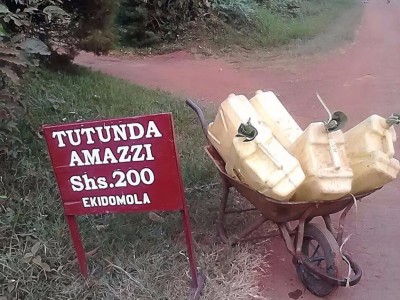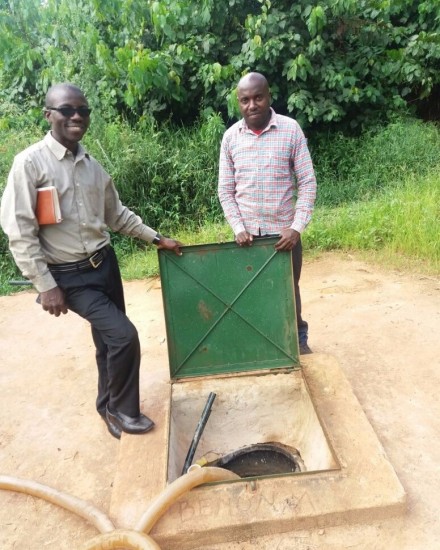Kikondo, UG – Review Water Project Phase 1 successes and challenges after year one – 16 Dec 2016
 Wamukisa opened 2016 with the completion of Phase 1 of their community water distribution system. They are ending 2016 by reflecting on the project’s challenges and successes and looking forward to improvement priorities in 2017.
Wamukisa opened 2016 with the completion of Phase 1 of their community water distribution system. They are ending 2016 by reflecting on the project’s challenges and successes and looking forward to improvement priorities in 2017.
Community Impact
The objective of the Wamukisa water project is to provide families with a sustainable supply of fresh, affordable water for use at home and with small agriculture projects. Phase 1 of the project brought water 310 meters closer to families’ home, which translates to a savings of either 300 UGS (US $0.10) per 20 liter bucket or 10 minutes of walking to fill a 20 liter bucket. While these savings are significant, they are just a step in the right direction to giving families in Kikondo a clean, affordable, sustainable water supply.
The project has also impacted the community by modeling the benefits of organizing and managing the local water supply. Before Wamukisa started their project many community members were hesitant to formally organize control of local springs because the springs had historically operated without organization. People feared organization might lead to increased costs or reduced freedom to use springs. However, rapidly growing population, increased use of boreholes and wells, and deterioration of the springs had begun to take a toll. Local leaders saw how giving community members specific responsibilities for different water sources actually reduced long-term costs and improved the experience for spring users. This inspired the local government to create committees to manage each of the 3 springs in Kikondo.
 The water project also enabled Wamukisa to expand their demonstration garden and begin building out commercial gardens for large scale sales. This will benefit the community because Wamukisa is gaining valuable knowledge about market demand and localized growing techniques. As more families get water access and begin starting their own gardens, they will benefit from this knowledge by growing crops that Wamukisa knows grow well and have a strong market.
The water project also enabled Wamukisa to expand their demonstration garden and begin building out commercial gardens for large scale sales. This will benefit the community because Wamukisa is gaining valuable knowledge about market demand and localized growing techniques. As more families get water access and begin starting their own gardens, they will benefit from this knowledge by growing crops that Wamukisa knows grow well and have a strong market.
Financial Sustainability
To encourage sustainable self-reliace, funding for Phase 1 of the water project was split between grant funding and a loan. Throughout 2016 Wamukisa has stayed up to date with loan repayments. They have also kept up with normal operating expenses like fuel, minor repairs, tank cleaning, oil changes, and preventative maintenance.
At year-end Wamukisa has roughly 100,000 UGS (US $30) in a savings fund for major repairs and replacements. This figure is below what Wamukisa needs to save to achieve sustainable self-reliance. Currently, Wamukisa is exploring options to improve service, increase revenues, and provide greater community impact in 2017.

